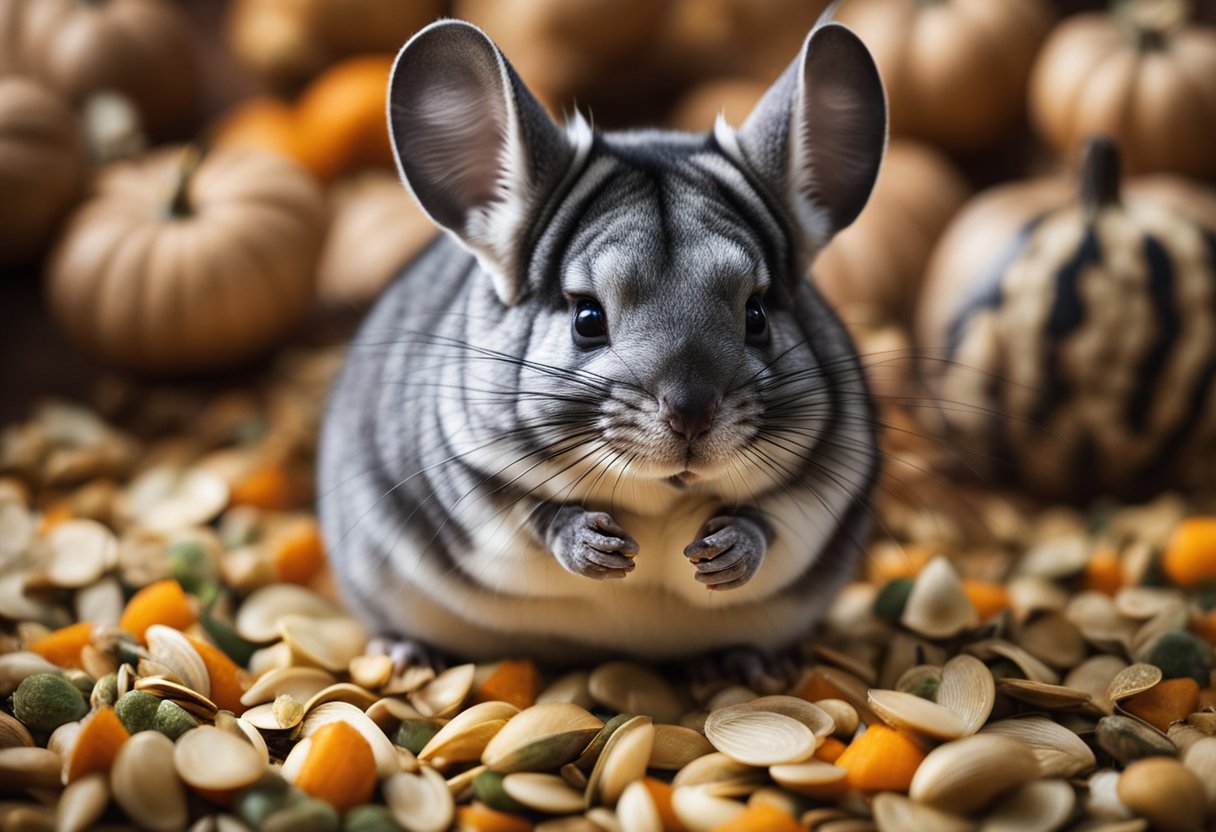Can Chinchillas Eat Pumpkin Seeds? Understanding Their Diet and Safety
Chinchillas have specific dietary needs that must be met to keep them healthy. You may wonder if pumpkin seeds are a safe treat for your pet. Yes, chinchillas can eat pumpkin seeds, but they should be given in moderation due to their high fat content.

Understanding your chinchilla’s diet is key to their well-being. Pumpkin seeds are a tempting snack, but overindulgence can lead to health issues. It’s important to find the right balance to keep your chinchilla happy and healthy.
Key Takeaways
- Chinchillas can eat pumpkin seeds in small amounts.
- Pumpkin seeds should not replace a balanced diet of hay and pellets.
- Moderation is essential to prevent potential health risks.
Understanding Chinchillas’ Dietary Needs

Chinchillas require a balanced diet to stay healthy and thrive. Understanding their nutritional needs and health considerations is key for pet owners. This section focuses on the essential elements of a chinchilla’s diet and important health factors to keep in mind.
Nutritional Requirements
Chinchillas need a specific balance of nutrients. Their diet should mainly consist of hay, which provides essential fiber. Aim for a handful of hay daily. You can also supplement this with quality pellets—about 30 to 80 grams each evening.
Adding fresh vegetables and limited fruits can offer variety. Vegetables like carrots and fruits like apples can be given in small amounts once a week. Always avoid high-fat treats and ensure any extra food is safe for chinchillas.
Health Considerations for Chinchillas
When feeding chinchillas, keep in mind their sensitive digestive systems. Foods high in fat and sugars can lead to serious health issues. For example, while pumpkin seeds can provide nutrition, moderation is crucial. Offer only a small amount, such as one seed once or twice a week.
Keep an eye on your chinchilla’s weight and health. If you notice any changes in behavior or appetite, consult a veterinarian. Regularly providing fresh water is essential for hydration and overall health.
Pumpkin Seeds and Chinchillas

Feeding pumpkin seeds to chinchillas can offer some benefits, but there are important factors to consider. You must ensure the right serving size and be aware of risks associated with their diet. Here’s what you need to know.
Benefits of Pumpkin Seeds
Pumpkin seeds can provide some nutritional benefits for your chinchilla. They are a source of healthy fats, which can be beneficial in small amounts. These seeds also contain vitamins and minerals, including magnesium and zinc, which support your pet’s overall health.
In moderation, pumpkin seeds can be a tasty treat. They may help vary your chinchilla’s diet and make feeding time more interesting. Just remember that not all treats are created equal, so choose wisely.
Risks of Feeding Pumpkin Seeds
While pumpkin seeds can be a treat, they also come with risks. Chinchillas require low amounts of sodium and fat, which pumpkin seeds do not provide. High fat content can lead to obesity or digestive issues if fed too often.
Feeding too many pumpkin seeds may upset your chinchilla’s stomach or result in diarrhea. It’s crucial to monitor your pet for any adverse effects after introducing new foods. Limit the frequency of these seeds in your chinchilla’s diet to keep it healthy.
Proper Serving Size and Frequency
The right serving size is essential for your chinchilla’s health. A small portion of 1-2 raw, unsalted pumpkin seeds is usually adequate. This amount limits the risk of health problems while allowing your pet to enjoy a treat.
You should only offer pumpkin seeds occasionally, not daily. Aim for once every couple of weeks. Always introduce new foods gradually and in moderation to prevent dietary upsets. Make sure to watch for any signs of discomfort after feeding.

